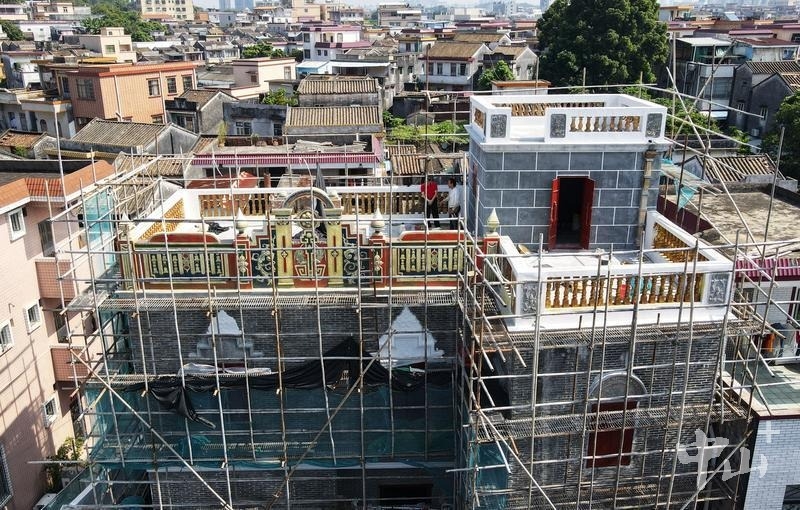Rinse, air dry, repair, paint... Huang Jinshan constantly switched between his tools, working with great focus and care.
Watching his relative from Hong Kong restore the damaged lintel, Zhang Dali felt a mix of excitement and skepticism.

Several days later, when Zhang Dali returned to the scene, he saw that the previously brightly colored lintel had become dim, resembling a weathered antique painting, and finally met his expectations. At that moment, he put his mind at ease.
The house Huang Jinshan renovated was built in 1930, a legacy from Zhang Dali's grandfather. In 2009, this house was recognized as a "Historical Building of Zhongshan City". Zhang Dali desired to restore it to its former glory, illuminating the old house with its diverse cultural and architectural styles. His cousin Huang Jinshan, who once stayed in the house for two nights three decades ago, ultimately undertook the task.

Huang Jinshan has been involved in the restoration of antiques and old houses in Hong Kong for 40 years. "In my memory, it was a beautiful old house adorned with many ancient furniture pieces," recalled Huang Jinshan.
Currently, the restoration of the gray sculptures and murals on the window lintels, roof parapets and corridor light shadow ceilings has been mostly completed. The restoration of Zhang's ancestral home can be finished in one month, fulfilling Zhang Dali's long-standing wish.

In the last century, Zhang Dali's grandfather went to Mexico to engage in small business. With his kindness and friendliness, he earned his place in the local community and made some money. He returned to his hometown, where he purchased land and built the house. It was a microcosm of overseas Chinese from Zhongshan who work hard and love their hometown. "I hope to restore the old house as much as possible through modern architectural techniques and cultural relic restoration methods. By activating the property of my grandfather, we can retrieve the beautiful memories of this old house from childhood."
In recent years, many historical buildings in Zhongshan have been revitalized and utilized as grassroots public cultural facilities, such as rural libraries, traditional craft exhibition venues and research and education bases. Some of them are also used for commercial purposes, such as homestays, cafes and special restaurants.
Police Registration Number: 44200002442868
Website ID: 4420000052
Sponsored by: Office of Zhongshan Municipal People's Government
Technical Support: Information Center of Zhongshan
Without written authorization from Zhongshan Municipal People’s Government, the content of the site shall not be republished or used in any form.
About Us | Site Map| Privacy Statement| Contact us
